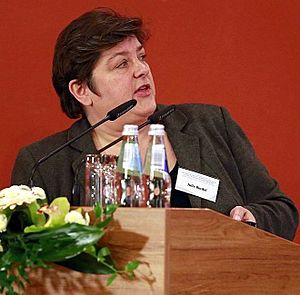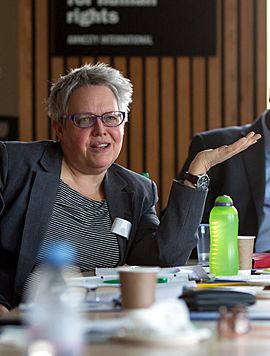Julie Bindel facts for kids
Quick facts for kids
Julie Bindel
|
|
|---|---|

Bindel in 2015
|
|
| Born | 20 July 1962 Darlington, County Durham, England
|
| Occupation | Journalist, writer, cultural critic |
| Organization | Co-founder of Justice for Women |
| Known for | Law reform, advocacy journalism |
| Movement | Radical feminism, lesbian feminism |
| Partner(s) | Harriet Wistrich |
Julie Bindel (born 20 July 1962) is an English writer and a radical feminist. This means she works to challenge and change the systems in society that she believes are unfair to women. She is a co-founder of an organization called Justice for Women. This group helps women who have faced legal trouble for defending themselves against violent partners.
Much of Bindel's work focuses on protecting women and children from harm. ..... She has worked as a researcher at several universities, including the University of Lincoln and Leeds Metropolitan University.
Bindel has written or helped write over 30 book chapters and five books. She also writes for newspapers and magazines like The Guardian, the New Statesman, and The Spectator.
Contents
Early Life and Activism
Julie Bindel grew up in Darlington, a town in the north east of England. She lived on a council estate with her two brothers.
When she was 17, Bindel moved to Leeds. There, she joined the Leeds Revolutionary Feminist Group. At that time, a dangerous criminal known as the Yorkshire Ripper was active in the area. He murdered 13 women and attacked seven others between 1975 and 1980.
Bindel was very angry about these crimes and how they were handled. She felt the police were not doing enough to protect all women. This experience inspired her to begin her lifelong campaign to end violence against women.
Bindel and other feminists protested to demand safety for women. They put up posters in Leeds that advised men to stay home at night. This was to show how unfair it was that women were being told not to go out.
Justice for Women
A major part of Bindel's work has been researching violence against women. In 1991, she co-founded the group Justice for Women (JFW) with her partner, Harriet Wistrich, who is a lawyer. JFW is a group that works to change laws that it sees as unfair to women, especially in cases involving self-defense.
The group was first created to help a woman named Sara Thornton. JFW also supported the campaign for Kiranjit Ahluwalia. Both women had been convicted for the deaths of their violent husbands. JFW argued that the law did not properly consider the danger the women had been in.
The Emma Humphreys Case
One of JFW's most famous cases was that of Emma Humphreys. In 1985, when she was 17, Emma was convicted of murder for killing her violent boyfriend. In 1992, she wrote to JFW from prison asking for help.
With support from Bindel and Wistrich, Emma appealed her conviction. She argued that she had acted after suffering from long-term harm. The appeal was successful, and in 1995, Emma was released from prison. This was a very important moment for women's rights in the legal system.
Sadly, Emma Humphreys died three years later. Bindel and Wistrich had become her friends and were deeply saddened by her death. They edited a book based on her life story. They also created the Emma Humphreys Memorial Prize, an award given each year to people and groups who work to stop violence against women and children.
Research and Writing
Bindel has researched and campaigned against the exploitation of women since the 1970s. She believes it is a harmful practice rooted in inequality. .....
She has also written reports for city councils and charities. In 2004, she wrote a report for Glasgow City Council about lap dancing. ..... The report found that many of these places were hidden in normal houses and apartments.
Views on Feminism and Society
Bindel is a critic of what she calls "call-out culture," where people focus on shaming individuals online. She believes that real change comes from campaigning to fix unfair systems and laws. She points to the work of Justice for Women as an example of successful activism.
She also believes in free speech and is against "no-platforming," which is when a person is banned from speaking at an event. She argues that it is better to understand and debate different views rather than censoring them.
Gender
Bindel believes that gender is created by society, not biology. She argues that society has strict ideas about how boys and girls should act, and these ideas, or gender roles, can be harmful, especially to women. She would like to see a world without these limiting gender roles.
In 2004, she wrote a newspaper column that caused a lot of controversy. Many people felt the article was offensive in its tone and views. Bindel later apologized for the tone of the article. Because of her views, some student groups have cancelled her speaking events.
Marriage
Bindel does not support the idea of marriage. She calls it an old tradition from a time when women were seen as property. She believes that even same-sex marriage follows this outdated model. Instead, she thinks the government should offer civil partnerships for all couples.
Recent Events
In June 2022, a talk by Bindel at a library in Nottingham was cancelled by the city council. The council said her views did not align with their support for the LGBT community. The talk was held outside the library instead.
Bindel decided to take legal action against the council. In October 2022, Nottingham City Council apologized to her. They admitted that their decision to cancel the event was unlawful. The council agreed to pay for losses and handle future bookings lawfully.
 | Charles R. Drew |
 | Benjamin Banneker |
 | Jane C. Wright |
 | Roger Arliner Young |


